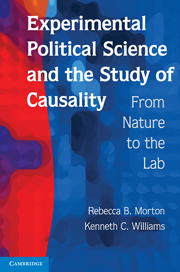Book contents
- Frontmatter
- Contents
- Acknowledgments
- I INTRODUCTION
- II EXPERIMENTAL REASONING ABOUT CAUSALITY
- III WHAT MAKES A GOOD EXPERIMENT?
- IV ETHICS
- 11 History of Codes of Ethics and Human Subjects Research
- 12 Ethical Decision Making and Political Science Experiments
- 13 Deception in Experiments
- V CONCLUSION
- References
- Author Index
- Subject Index
13 - Deception in Experiments
Published online by Cambridge University Press: 05 June 2012
- Frontmatter
- Contents
- Acknowledgments
- I INTRODUCTION
- II EXPERIMENTAL REASONING ABOUT CAUSALITY
- III WHAT MAKES A GOOD EXPERIMENT?
- IV ETHICS
- 11 History of Codes of Ethics and Human Subjects Research
- 12 Ethical Decision Making and Political Science Experiments
- 13 Deception in Experiments
- V CONCLUSION
- References
- Author Index
- Subject Index
Summary
Deception in Political Science Experiments
In the previous chapter we highlighted a number of ethical issues in experimentation, one of which is the use of deception. Many consider deception not unethical per se and believe it is permissible to engage in deception when it is required to do so for the research and the risks are minimal or sufficiently minimized as discussed in the previous chapter. Deception occurs in many political psychology experiments, such as Druckman and Nelson's use of fake New York Times articles (see Example 5.1). In this sense, political psychology uses deception in the same way that it is used in social psychology experiments generally. Deception is widespread in social psychology; Hertwig and Ortmann (2001) reported that deception in experimental articles in the top-ranked journal in social psychology, the Journal of Personality and Social Psychology, averaged between 31% and 47% from 1986 to 1997. Deception is even more common in field experiments in political science, where it is standard practice for subjects not to even know they are participating in an experiment, as in the newspaper experiment of Gerber et al. (see Example 2.1). In some cases, deception in field experiments can also involve confederates posing in roles such as in the bribery experiment in Mexico City (see Example 12.3).
Deception is also used in political economy experiments.
- Type
- Chapter
- Information
- Experimental Political Science and the Study of CausalityFrom Nature to the Lab, pp. 500 - 522Publisher: Cambridge University PressPrint publication year: 2010



